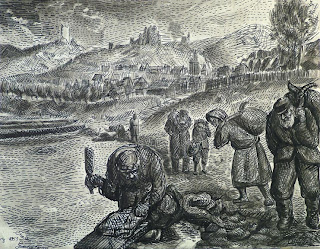A Simple Jew asks:
It has been taught that a person accomplishes his tikun neshoma by overcoming obstacles and performing the mitzvah that he finds most difficult to observe. What mitzvah is this for you and how have you struggled to overcome the obstacles?
Yitz of A Waxing Wellspring answers:I know it isn't exactly what you hear every day, but I'm sure there are many people who feel similarly. I've always wanted to die al kiddush HaShem. My name Yitzhak has always had me associated with the Akeidah. I don't mean to say I'm suicidal, suicide is forbidden by Judaism, and dying for no reason seems pretty pointless. I've always wanted to die al kiddush HaShem.
Which, to answer your question, makes living al kiddush HaShem my ideal Tikkun. This is the hardest thing for me to bear. I have no problem with tasks that have deadlines, (not that I in any way enjoy the stress of deadlines) but open-ended tasks that never end weigh very heavily on me. Living for HaShem is something that takes literally a lifetime.
When I was younger (very early teens, late teens, even early twenties) I had the distinct impression that I was here by mistake, that I couldn't possibly bear the burden of living every day and suffering the knowledge of all the things I was doing wrong. Not that HaShem ever makes mistakes. I imagined that I had made a special request of HaShem either to come here, or to come back, and HaShem, in His infinite kindness, granted my request. So, it was my mistake. I didn't know how hard living in this world would be, or so I imagined.
Coming to Israel and learning Hassidut allowed me finally to start to see a way to live my life al kiddush HaShem. First I learned the Hassidut of Rebbe Nachman, Sichot Haran mornings and nights, on the busses to and from work or wherever else I was going. Later I picked up the Tanya, learning a perek a day, I went through it three times in one year. In college I had once asked the Chabad Rabbi (Eliyahu Cohen) @ NYU what was the fifth level of Torah that corresponds to the fifth level of the soul (yechidah) and fifth level of the world (adam kadmon)? He told me Hassidut and specifically Tanya. At the same time I was learning Likkutei Moharan on Shabbat night each week. One Torah each week.
Hassidut felt very much like coming home. I was raised by my parents to be creative, to think outside the box. My problem was that outside the box there's always another box and I was driven by the challenge to think outside ALL of them. In Hassidut I finally found a derech of Torah that incorporated the ability to endlessly turn something on its head, always learning new hidushim from the simplest of ideas. In Hassidut I found that everything had its root in something good and that Happiness was something we control and not something that controls us. (The Tanya explains that we can be happy and sad simultaneously and there is no logical contradiction.) Another problem I had with logic was the difficulty people had with paradoxes. I never found them a problem, in general they were comforting because of the symmetry and the depth of the wisdom they contained. This awareness and acceptance of paradox also found a home in Hassidut.
As I grew HaShem sent me everything I needed, a Rav who knew so much I could never know more than him, my main requirement in a Rav at the time. It turned out he was also a Sephardi Rav, the student of a great Mekubal, with a tremendous closeness to Hassidut and Tzaddikim living in our time. He helped me to piece together all of my answers and questions, encouraged me to learn the Maor Eynayim and eventually the Notzer Hesed.
The Tanya taught me that this world was better than the next world, because here we can enjoy a closeness with HaShem that we can't attain there.
Rebbe Nachman taught me that we can bring things entirely to the side of good simply by finding points of goodness in them.
The Baal Shem Tov taught me that every stimulus is part of HaShem's relationship with you and also that judging people only accomplishes passing judgement on yourself. (and In reality all of the other teachings listed here are just a fleshing out of the Baal Shem Tov's teaching)
The Maor Eynayim taught me to connect everything back to its source in HaShem.
The Noam Elimelech taught me that Tzaddikim recreate a more favorable world through their prayers.
The Notzer Hesed is still teaching me about ayin, about losing yourself in HaShem.
(Tears come to my eyes thinking about this, even now, the priceless treasures of Hassidut with which I was blessed.)
It wasn't until I was married, Pesach 5766, that HaShem made it clear that every choice I had made and every step I had taken had lead me to the right place. Finally I understood that I was supposed to be in the world, right here, right now. That HaShem puts us wherever we need to be most.
There are two major obstacles to my tikkun today: Zrizut and Humility.
As an offshoot of living for HaShem, there is the matter of not dragging your feet about it. Avraham Avinu was the living embodiment of this midah, the midah of zrizut. I have so much trouble with this. Getting up on time, getting anywhere at all on time, being consumed with the desire to jump into a mitzwah rather than taking my time to warm up to a mitzwah, once I've taken care of my own basic needs and let my yetzer get the better of me a little.
The other issue is that I'm deathly afraid to go down the path of selflessness. I don't really see another way to go, and I don't really want my possessions or anything at all other than to serve HaShem, but I'm still afraid I won't have the strength or the drive. I'm afraid people won't understand, or that my yetzer is lying to me and deluding me, that perhaps this isn't my path at all.
I'm not exactly a ba'al teshuvah, my parents were ba'alei teshuvah in their teens and twenties, I grew up religious, knowing HaShem and knowing what a Jew is supposed to do, but I think, and I've written about it, the hardest part of being a ba'al teshuvah is going from trusting your own internal voice (without which you could never have returned to HaShem) to the bitul of ignoring yourself and your own needs in the face of others. In that sense I am a ba'al teshuvah.
I did follow my internal voice to bring me to where I needed to be. And now, I'm afraid to let go of what I've always thought is "me." But I'm starting to get the impression it's not me, it's my yetzer.
I don't think anything else needs to be said except that when I look back at where I've been I can only thank HaShem for every moment of it. I don't know how I got there, or why I did what I did, but it got me to where I am today. When I look forward I need to remember that the biggest kiddush HaShem is recognizing that nothing comes from me.





 (Picture by Rebecca Marr)
(Picture by Rebecca Marr)





 (Picture by Letizia Ribechini)
(Picture by Letizia Ribechini)







































